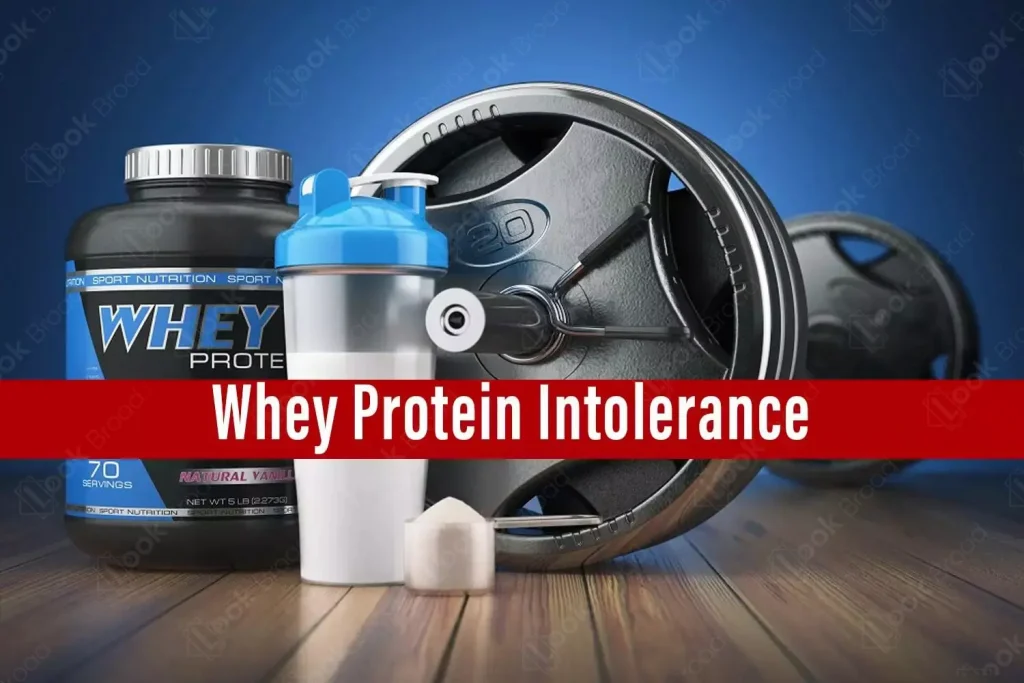Whey protein is the most famous food supplement in the world. In some people, Whey protein intolerance is common despite its several health advantages. This is famous among bodybuilders since they build their bodies and attain muscle strength. Like other food supplements, whey protein comes with some merits and demerits.
Excess whey protein in the body can damage the liver and kidney and lead to osteoporosis. Similarly, some people have an allergy to this protein. Read this article till the end and learn about whey protein allergy.
Whey protein is a plant-based protein considered very healthy, but some people can be whey intolerant. In the case of allergy or intolerance, you should avoid taking whey powder and if the symptoms are not going away, see the doctor.

What is Whey Protein?
It is a popular dietary and fitness supplement. It is made from whey, a liquid protein, and easy to separate from milk during the cheese-making procedure. It is then spray-dried, refined, and filtered into whey protein powder. There are three main kinds of whey protein. The major difference between them is the way of processing.
Whey Protein Hydrolyze
This type is pre-digested that allows your body to absorb it quickly
Whey Protein Isolate
It contains 90% or more protein. It is a more refined form that contains less fat and lactose, but it has some useful minerals.
Whey Protein Concentrate
It comes with 70-80% protein, is a usual whey protein, and contains minerals, fat, and lactose from milk.
Whey protein is famous among fitness enthusiasts, athletes, and other people who want to lose weight and build muscles. It helps users lose weight by boosting metabolism, reducing appetite, building strength and muscles, and recovering from exercise.
It is an essential source of protein that contains amino acids. The human body does not prepare amino acids on its own, so it is important to include them in one’s diet. It is very simple to take it with liquid and water.
Whey Protein Intolerance / Allergy
Some people are sensitive to Whey protein that they suffer from severe reactions in the form of hives, rash, and skin allergies. In some people, itching on the skin is very common due to whey protein. It is a Whey protein intolerance that occurs due to Whey protein supplements.
Some people are allergic to milk, and the Whey Protein Milk Allergies are usual in them to not consume this supplement. After consuming milk, they experience a runny nose, tongue swelling, throat swelling, facial swelling, rashes, and hives. It triggers life-threatening allergic reactions and anaphylaxis.
What Allergens are in Whey Protein?
The Whey protein includes bovine serum albumin, immunoglobulin, alpha-lactalbumin, and beta-lactoglobulin. Among all these, some other compounds are found in the development of milk allergies. Whey protein develops inflammation in the digestive tract.
If you are allergic to cow’s milk, it does not mean that you will be allergic to Whey protein lactose intolerance, and whey allergies are two different things. Whey Protein Lactose Intolerance can be due to the immune system that starts protecting the body from harm. It starts producing antibodies, and that causes physical symptoms like rashes, swelling, and others.
Can you be Intolerant to Protein Powder?
Some people are sensitive to protein powder, and they experience some Whey Protein Allergic reactions, including rashes on the skin, hives, inflammation, and swelling. Some persons have complaints of itching on the skin within minutes of consuming whey protein powder. It develops hives in the body that can be a painful experience for the patients.
Whey Protein Intolerance is different from milk allergy. However, it gives signs that allow you to learn that he is allergic to whey protein powder. If a person has an allergy to Whey powder consumes this protein, the body releases immunoglobulin E antibodies. This is the indication for the white cells in the body to produce histamine for protection from infection. Histamine is the chemical that releases into your soft tissues. Its excess quantity causes inflammation, irritation, and blood flow.
Whey Protein Intolerance Symptoms
If someone is allergic to Whey powder, he may not experience some noticeable allergy reactions in first consumption. In the future, after your body becomes sensitive to it, the reaction will be severe. Some of its symptoms are similar to Casein Intolerance. It can be severe in some persons.
The seriousness of the reaction varies from person to person since a person’s anatomy is different from the other. Some people are highly sensitive to this protein type, so they experience skin rashes, itchy and others. Some of the common symptoms of whey protein sensitivity are here.
Digestive Problem

This is similar to lactose intolerance, but the immune system starts indicating to avoid Whey powder. Digestive problem after consuming the Whey protein is a strong sign of an allergy. You may suffer from excessive gas, Whey Protein Bloating, diarrhea, cramps in the stomach, and others. It is due to the unprocessed components of supplements in the small intestine.
Allergic Reaction on the Skin
Sometimes people who have Whey protein intolerance get skin rashes and itchy right after opening the powder package without consuming it. This is an immediate reaction against this protein.
Swelling on Mouth, Lips, Tongue, and other Facial Areas
If you experience swelling in your mouth area, tongue, lips, and other body parts due to the post-consumption, this is a sure sign of Whey protein sensitivity. It is a severe allergic reaction, leading to an anaphylaxis response.
Signs after Consumption Whey Protein
After consuming the Whey powder, you may experience some other signs like sneezing, coughing, red eyes, watering eyes, runny nose, and others. Nausea, bloating, stomach pain, and intestinal cramps, as well as diarrhea and gas, are the signs when your body starts consuming it. Your throat will start tightening up, and you will feel problems in breathing. In some cases, it can be life-threatening
You must be conscious while opening the package; if you feel above given allergic signs, you must not consume the powder. It will react very badly to your body, and it can be a risk to your life.
Does Whey Protein make you Bloated?
Yes, it makes one bloated if he is sensitive to Whey Protein. The reason behind it is that your body rejects this protein. It fights against it because your intestines cannot break it down effectively. This indication causes mucus production, digestion problems, gas production, cramps in the abdomen, stuffy nose, and swelling in the airways.
Are there any Negative Side Effects to Whey Protein?
Yes, there are several side effects of consuming this protein. If you take it by mouth, then Whey Protein and bloating are very common. However, it is safe for most adults, but people who are not sensitive to this protein may have bloating issues. Excess and high doses lead to some side effects, including headaches, tiredness, reduced appetite, nausea, thirst, acne, bowel movements, and others. Some other important and severe side effects are here.
Lungs Problem
Sensitivity to lung disease makes it harder to breathe, and it is famous for the medical condition known as chronic obstructive pulmonary disease. In this condition, the patient cannot breathe properly because it tightens the throat, and the tract swells.
Osteoarthritis

It does not improve the condition of the brittle and weak bones. Taking this protein by mouth cannot help you in aging.
Damages Kidney and Liver
Taking high-protein food can increase the pressure inside the liver and kidneys. It leads kidneys to filter blood more than a regular time. It does not mean that high-protein food is harmful to kidneys every time. Consuming Whey protein regularly can put more pressure on the kidneys. If you are already suffering from kidney problems, you must avoid taking it.
Whey Protein Allergy Treatment
There are some treatments for Whey protein intolerance. If you experience some signs of an allergy, you need to consult your doctor immediately. You must not delay visiting the doctor if you are suffering from swollen throat and difficulty breathing. Learn more about these treatments below lines.
Major Interaction
Avoid taking Whey powder and the products that contain Whey protein like cheese.
Levodopa and Whey Protein
Avoid taking the Levodopa and Whey powder simultaneously because both can react against each other.
Some interactions are not good with each other, so one should avoid taking those combinations simultaneously. Always take antibiotics two or three hours before taking the Whey powders.
There is no specific treatment for whey Protein Allergy. You cannot stop or treat it completely—the only way to prevent you from this hassle is to avoid eating Whey products. If symptoms appear, you need to visit the doctor, and with on-time medical assistance, you can get rid of the signs.
Final Verdict
For the majority of people, Whey protein is safe. It causes some digestive signs in those with lactose intolerance. Moreover, its excess consumption may be harmful to you. To avoid severe health problems, you should not consume whey protein foods. Ricotta, cheese, cottage cheese, and yogurt are rich in Whey protein.
One who has Whey protein intolerance should avoid taking these foods. There is no specific treatment for this allergy so prevention is better than cure.
